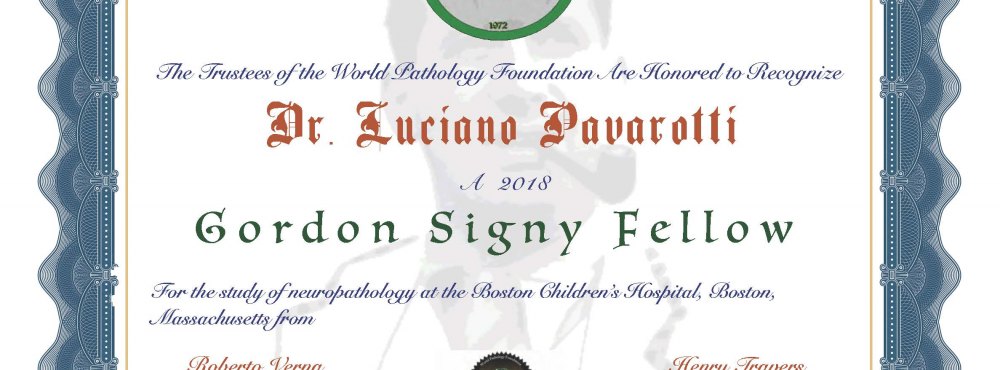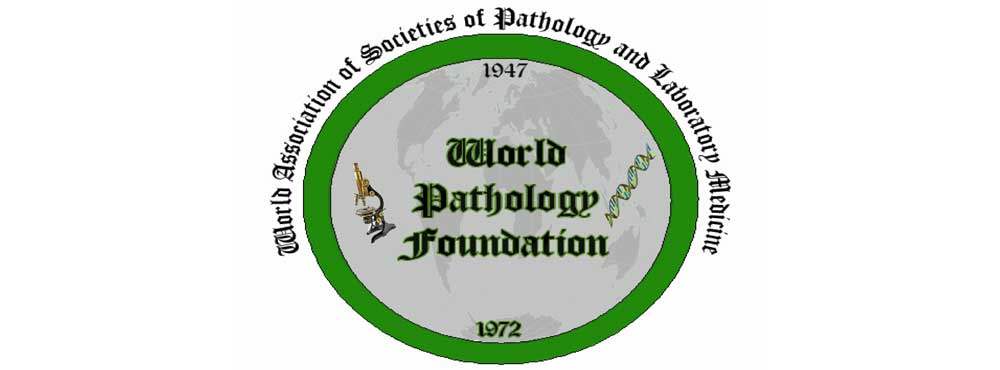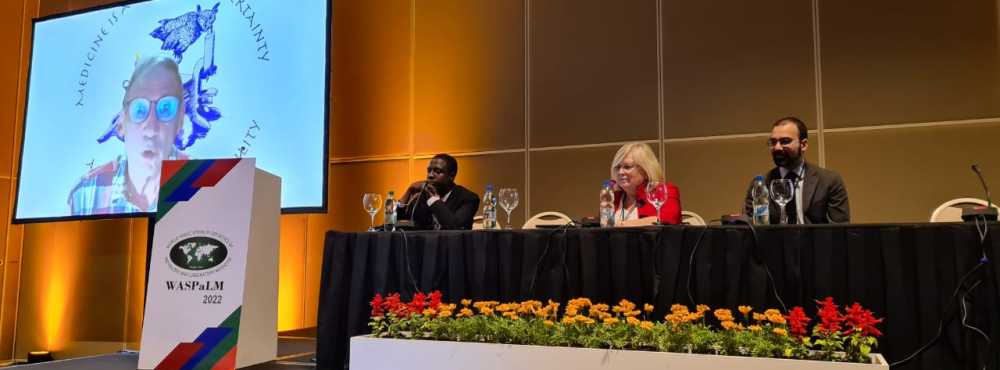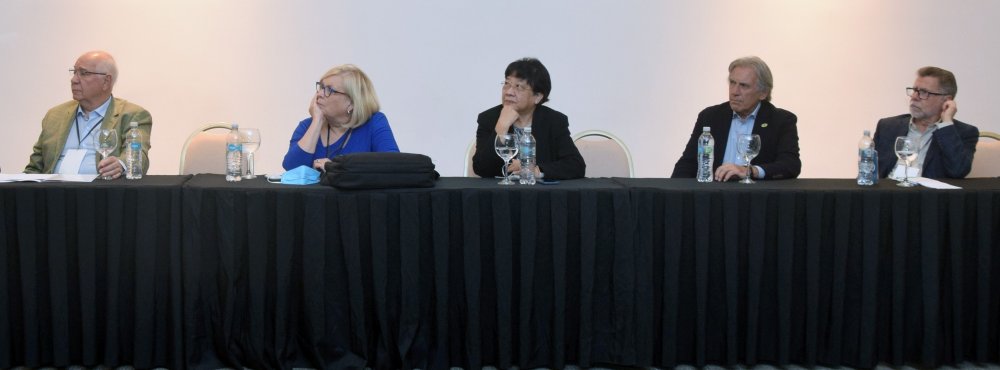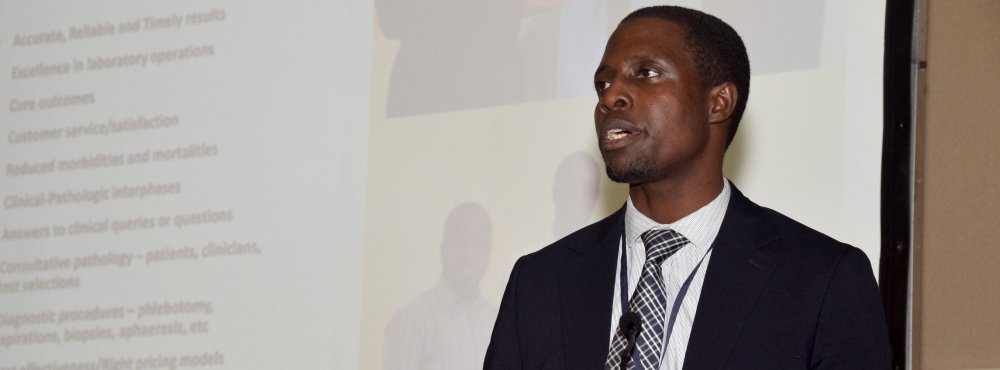Gordon Signy Fellowships
General Information
The information below applies to applications for training in 2024 which are due by 30 June 2023.
ANSWER THESE STATEMENTS FIRST!
1. I am medically qualified (a doctor of medicine) ___YES ____NO
2. I am a pathologist (Laboratory Medicine Specialist) ____YES ____NO
3. I am currently living in my country of origin or permanent residence ____YES ____NO
If you answered "NO" to ANY of these questions, you are NOT ELIGIBLE for a Gordon Signy Fellowship.
PLEASE DO NOT COMPLETE AN APPLICATION FOR FELLOWSHIP
1. Aim: The aim of the Gordon Signy Fellowship is to promote the public safety and the public health by fostering the development of anatomic and clinical pathology in all aspects, especially in the developing countries. It is the intent of the Fellowship to provide opportunities for pathologists to study in countries other than their own and to return to their home countries with new skills to help their patients.
2. Award Amounts, Payments and Fellowship Certificates: The Fellowship provides an award of US $5,000 payable in two installments, the first US $4,500 at the beginning of a period of study and US $500 upon receipt of Fellows' reports of their experiences (see item 11 below). For training periods exceeding 89 days, and at the discretion of the Regents of the Fellowship, an award of up to US $7,500 may be provided. A certificate of Fellowship will be issued to each Fellow after the final Fellowship Award payment.
3. Number of Fellowships: The number of Fellowships offered each year is decided by the Trustees. For 2023, one Fellowship is offered, although it is up to the Regents, after evaluating the applications, to decided the number to be awarded.
4. Fellowship Purpose: The Fellowship is to assist a young pathologist who desires training not available in the pathologist’s own country (this means the country of the pathologist’s birth or permanent residence at the time of the application) to train in another country. It is expected that the special skills learned in this training will improve the care of patients when the Fellow returns to his or her own country. The award is not intended to support general training in pathology.
5. International scope: The Fellowship is open to pathologists from all countries. As stated in (4) above, it is the intent of the Fellowship to allow pathologists to acquire skills through training that is not available in the countries where they reside. Further, it is the intent of the Fellowship for Fellows to return to the communities where they live and apply the skills they have learned for the benefit of their patients. Therefore, applicants must be living in their country of origin or their country of permanent residence at the time of the application. For applications where residency is unclear, the Regents may require proof of residency for any individual applicant (this may include a driver's license or other form of government identification; electrical, telephone or other utility bills; or letters of certification from a governmental office).
6. Duration of Study: The duration of the study period is variable, but should be long enough to enable the applicant to acquire the skills proposed in the application.
7. Initial Training Completion and Country of Residence Requirements: Any pathologist:
a. who has completed his or her training in anatomical and/or clinical pathology or one of their branches prior to the beginning of their proposed fellowship training; and
b. who has completed training not more than 10 years prior to application deadline; and
c. who lives in his or her country of birth or permanent residence is eligible to apply for the Fellowship.
8. Training Location Requirement: Training must be in a country other than the country of the applicant's birth or permanent residence at the time of application.
9. Return to Home Country Requirement: The applicant must return to his or her own country as defined in (4) above after completion of the proposed course of study.
10. Training Director Approval Requirement: Applicants must provide a letter of acceptance from the person under whom the applicant is going to work. The letter must include approval of the proposed course of study.
NOTE: A letter from the institution where the applicant proposes to study must either accompany the application or, if sent separately, be received by the application deadline (30 June). The signed letter must state that the applicant has been accepted for study and that the proposed dates of study and the proposed duration of study are acceptable.
11. Letter of Reference Requirement: Applicants must provide one signed letter of reference from a teacher, supervisor, mentor, faculty or other person who was either part of their initial pathology training program or worked closely with the applicant in the practice of pathology.
12. Diploma and Certificate Requirement: Applicants must provide a copy of their Medical Degree and Certificate of Training. The copy may be a photocopy and need not be a certified copy from the medical school or training program.
13. Disclosure of Support Requirement: The applicant must disclose all other sources of support (personal, family, corporate, other fellowships and training awards and so on) that will provide funds for the proposed training.
14. Curriculum Vitae Requirement: Applicants must submit a curriculum vitae that includes their name and address, current employment, education, memberships in professional societies and organizations, appointments to health care staffs (e.g. medical staff of a hospital), research (if any) and publications (if any).
15. Report Requirement: At the conclusion of the program, the fellow must submit a short report to the World Pathology Foundation. The report will be published on the WPF web site. Final Fellowship payments will not be made until this report is received.
Award Selection and Announcements: The award will be made by the Trustees of the World Pathology Foundation on the advice of an international Board of Regents. Awards will be announced no later than 1 September 2023.
Board of Regents Considerations: In assessing the applications, the Board of Regents will consider the scientific and clinical merit of the application, the qualifications of the applicant, the value of the proposed study to the applicant, and the value of the proposed study to the applicant's community. Other sources of income may be held at the same time as the Fellowship, but in making their recommendation the Board of Regents will consider the financial need of the applicant.
Retrospective Award Prohibited: The Board of the Trustees will not award a Fellowship to support a course of study already completed. Trainees already in training, or for whom Fellowship training will begin prior to 1 January 2023, are not eligible to apply for a Gordon Signy Fellowship.
Application Procedure
Applications are currently being accepted for Fellowship training beginning on or after 1 January 2024 and ending no later than 31 December 2024. Applications must be received by 30 June 2023. Applicants must have completed their initial pathology training prior to the beginning of their proposed fellowship training. If applicants have not completed their initial pathology training prior to the current application date (30 June 2023), the applicant MUST submit documentation of the completion of initial training before funds can be provided for the Fellowship.
Application Forms: You may complete the forms using one of the formats below. The PDF FORM format is designed to be completed on a computer, saved, printed and then mailed and emailed. The PDF-TEXT ONLY format can only be printed. It can then be filled out by hand, copied or scanned and mailed/emailed. The TEXT form may also be scanned and then completed on a computer. The forms contain all the information needed for completion of the application including the email and postal (airmail) addresses to which they must be sent. Forms must be emailed to gordonsigny@gmail.com.
Additional Forms to Assist You: In addition to the Application Forms, we have included a suggested format for the curriculum vitae and a checklist form to assist you in making sure your application is complete. You are free to use any format you wish for your curriculum vitae as long as the information contained in the suggested format is present.
If you have any questions, please contact the administrative office listed on the forms themselves.
PLEASE NOTE: (1) Incomplete applications received on the date of the application deadline will be rejected and not further considered by the Regents of the Fellowship. Applicants will be notified. (2) Pathologists submitting incomplete applications 5 or more days prior to the application deadline will be notified and given the chance to send additional material to complete their applications. Additional material must be received by the application deadline. (3) Applications received after the application deadline will be not be acknowledged or further considered. (4) There is no appeal for late or incomplete applications.
Please choose the application format that best suits your needs.
Please download or copy the forms below to assist you in preparing your application.
![]() Gordon-Signy Application Checklist
Gordon-Signy Application Checklist
![]() Gordon-Signy Curriculum Vitae Suggested Format
Gordon-Signy Curriculum Vitae Suggested Format
Gordon Signy Fellowship Awardees
| Year | Awardee | Country | Study | Institution |
|---|---|---|---|---|
| 1975 | Ponnu Goundar | Suva, Fiji | Frozen Sections | New Zealand |
| 1979 | S.E. Ikerionwu | Nigeria | Cytogenetics | U of Minnesota, USA |
| 1981 | Raj Mehrota | India | Liver Pathology | London, UK |
| 1981 | Victor K.E. Lim | Malaysia | Microbiology | UK |
| 1981 | Samir Sami Amr | Jordan | Liver & Kidney Path | Washington DC, USA |
| 1982 | Tivaadar Laszio Miko | Hungary | Stomatology | London, UK |
| 1983 | Ho-Cheong-Ho | Hong Kong | Neuropathology | Southampton, UK |
| 1984 | Milan Simic | Yugoslavia | Sudden death/drug abuse | Karolinska Hospital, SWE |
| 1984 | Zhu Simin | PR China | Immunopathology | Not Recorded |
| 1987 | Zhang Xin-Min | PR China | Soft Tissue Pathology | Toronto, CA |
| 1987 | Chi-Sing Ng | Hong Kong | Southern Blot Analysis | Toronto, CA |
| 1989 | Mmari Mirisho-Pente Wilson | Tanzania | Hemoglobinopathies | Univ Coll, London, UK |
| 1989 | Kin-hang Fu | Hong Kong | DNA Hybridization | Childrens Hosp, Vancouver, CA |
| 1989 | Kamthorn Thramprasert | Thailand | Kidney, Skin and cytologic pathology | Royal Melbourne Hospital, AU |
| 1990 | Venkatesh Murthy Sashidhar | India | Laboratory Quality Control | Loma Linda Univ Hosp, California, USA |
| 1990 | S. Bijur | India | Not Recorded | Not Recorded |
| 1991 | Sa Gilda Da Cunha Santos | Brazil | Fine needle aspiration biopsy | Karolinska Hospital, SWE |
| 1993-4 | A. Banjo | Nigeria | Cytopathology and Genetics | St. Mary's, London, UK |
| 1993-4 | B. Jafari | Iran | Fine needle aspiration biopsy | Toronto General, CA and Johns Hopkins, USA |
| 1995-6 | R. Makunike | Zimbabwe | Fine needle aspiration biopsy | Institute for Cancer Research, Oslo, SWE |
| 1995-6 | Angela Flavia Loguelo | Brazil | Head and neck tumors | Memorial Sloan Kettering, NY, USA |
| 1996-7 | Dr. Turgan | Turkey | Not Recorded | Not Recorded |
| 1996-7 | Dr. Popovska | Bulgaria | Not Recorded | Not Recorded |
| 1996-7 | Dr. Yazdanipour | Iran | Declined Award | No reason given |
| 1997-8 | Dr. Guevera-Pineda | Peru | Not Recorded | Not Recorded |
| 1997-8 | Dr. Pinto | Brazil | Not Recorded | Not Recorded |
| 1999 | Obiageli Eunice Nnodu | Nigeria | Fine needle aspiration biopsy | Not Recorded |
| 2000 | M. Olufemi Dada | Nigeria | Hematology | Kings College Hospital, London, UK |
| 2001 | Isin Soyuer | Turkey | Cytopathology | MD Anderson Cancer Institute, USA |
| 2001 | Jorge Sergio Reis Filho | Brazil | Breast pathology | Robbins Breast Cancer Research Center, London, UK |
| 2002 | Giedrius Salkus | Lithuania | Molecular and soft tissue pathology | Brigham & Women's, Boston, USA |
| 2002 | Perera Rajeeka Lakmalee Morawakage | Sri Lanka | Tissue Typing | North London Blood Center, UK |
| 2002 | Gabriel Oladiyi Ogun | Nigeria | Bone Tumors | Armed Forces Institute of Pathology, USA |
| 2003 | Smita Chowkekar | India | Dermatopathology | Ackerman Academy, New York, USA |
| 2003 | Narantsatsralt Narantsogt | Mongolia | Molecular Medicine | Tokai University, Japan |
| 2003 | Ceyda Kabaroglu | Turkey | Gas Chromatography; Mass Spectroscopy | VU University, Amsterdam, Netherlands |
| 2004 | Rashmi Tondon | India | Platelets | Cambridge & Bristol, UK |
| 2004 | Isabela Werneck Cunha | Brazil | Bone and soft tissue | Mayo Clinic, USA |
| 2004 | Teklu Legesse | Ethiopia | Declined Award | Death in Family |
| 2005 | Antonio Hugo Jose Froes Marques Campos | Brazil | Hematologic malignancies | Centro Nacional de Investigaciounes Oncologicas Molecular Pathology Programme, Spain |
| 2005 | Leticia Gresta | Brazil | Soft tissue pathology | Mayo Clinic, USA |
| 2005 | Aline Helen Da Silva | Brazil | Neuropathology & Hematopathology | University of California, Los Angeles, USA |
| 2006 | Rajalakshmi Tirumalae | India | Molecular dermatopathology | Dermatologikum, Hamburg, Germany |
| 2007 | Cristovam Scapulatempo Neto | Brazil | Urologic Pathology | Johns Hopkins, USA |
| 2007 | Joseph Marie Mendimi Nkodo | Cameroon | Cytopathology | Hospital Lariboisiere, Paris, France |
| 2008 | Alexandre Nakao Odashiro | Brazil | Not Recorded | Not Recorded |
| 2009 | No Award | No Award | No Award | No Award |
| 2010 | Jha Runa | Nepal | Hematology | Chandigarh, India |
| 2011 | Carlos Augusto Moreira Silva | Brazil | Hematopathology | Barcelona Clinic Hospital, Barcelona, Spain |
| 2012 | No Award | No Award | No Award | No Award |
| 2013 | D'Almeida Costa | Brazil | Neuropathology | Johns Hopkins, USA |
| 2013 | Henry Okuchukwu Ebili | Nigeria | Declined Award | No reason given |
| 2014 | Julio Diaz-Perez | Columbia | Dermatopathology | Wake Forest, USA |
| 2014 | Medina Rajbhandari | Nepal | Breast Pathology | Istituto di Ricovero e Cura a Carattere Scientifico, Turin, Italy |
| 2015 | Leonardo Lordello | Brazil | Gynecologic Pathology | Massachusetts General Hospital, USA |
| 2015 | Panjwani Poonam | India | Hematopathology | Stanford University, USA |
| 2016 | Geise Rezende Paiva | Brazil | Melanoma | Brigham and Women's Hospital, Boston USA |
| 2016 | Esperanca Paz Ussene | Mozambique | Neuropathology; fetal pathology | Centro Hospitalar Lisboa Ocidental-Hospital Egas Moniz, Portugal |
| 2017 | Ademola Samson Adewoyin | Nigeria | Hematopathology | Duke University, USA |
| 2017 | Pedro Henrique Pinto | Brazil | Hematology and Molecular Pathology | Instituto de Investigación Sanitaria - Fundación Jiménez Díaz / Madrid - Spain |
| 2018 | Dr. Tika Adilistya | Indonesia | Blood Banking | University of Groningen |
| 2018 | Dr. Greta Pandey | Nepal | Breast Cancer | Institute for Cancer Research, Torino, Italy |
| 2019 | Fredrick Otieno Okinyi | Kenya | Hematopathology | University of Siena, Italy |
| 2019 | Mehwish Javed Choudhary | Pakistan | Digital Pathology | University Hospitals Coventry and Warwickshire, UK |
| 2020 | Thiyaphat Laohawetwanit | Thailand | GI/Hepatobiliary | University of California at San Francisco |
| 2021 | Kiruthiga Kala Gnanasekaran | India | Hematopathology | Stanford University, United States |
| 2021 | Kalpana Singh | India | Pediatric and neonatal pathology | Sheffield Children's, United Kingdom |


